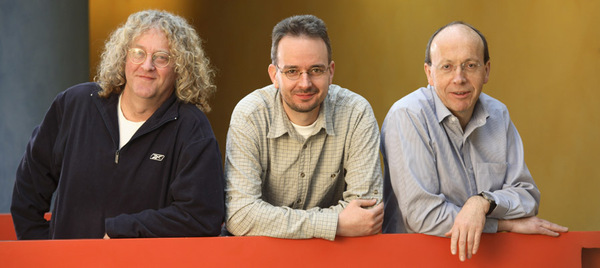I recently visited the Max Planck Institute of Molecular Plant Physiology (MPI-MP) in Potsdam-Golm, outside of Berlin, Germany. I’d like to introduce you to this institution, a truly outstanding center for plant science research.
The MPI-MP is one of more than 80 Max Planck Institutes in Germany. Five of the Institutes have a focus on or interest in Plant Biology:
- Max Planck Institute for Developmental Biology, Tübingen
- Max Planck Institute for Chemical Ecology, Jena
- Max Planck Institute for Terrestrial Microbiology, Marburg
- Max Planck Institute for Plant Breeding Research, Köln
- Max Planck Institute of Molecular Plant Physiology, Potsdam-Golm

The Max Planck Institute of Molecular Plant Physiology was founded in 1994 and has grown to having about 400 staff and scientists. The founding director was Prof. Dr. Lothar Willmitzer, who continues to serve as one of three directors. The MPI-MP is organized in three Departments, each containing independent research groups. The departments are led by the directors Lothar Willmitzer (Molecular Physiology), Mark Stitt (Metabolic Networks), and Ralph Bock (Organelle Biology, Biotechnology and Molecular Ecophysiology). There are 17 research groups within the three departments, and there are two independent junior groups as well.
The research output of the MPI-MP is impressive. A few recent papers are pictured here, but also check out all of the 161 papers published from the Institute in 2015.
The Institute benefits from excellent shared infrastructure groups and service units including Genomics and Transcript-Profiling, Applied Metabolome Analysis, as well as a Microscopy unit. They also have an outstanding team supervising plant cultivation and transformation. The plant growth facilities are state-of-the art and remarkably clean, which is of course crucial for obtaining reliable results from the kind of quantitative molecular assays at which the Institute excels.
The institute prides itself on its internationality. During my few days there I met young researchers from India, China, Brazil a nd all across Europe. English is the working language at the Institute; many of the young researchers confessed that they probably should have acquired a better command of the German language during their time at the Institute, but that there is not much need since business takes place in English.
nd all across Europe. English is the working language at the Institute; many of the young researchers confessed that they probably should have acquired a better command of the German language during their time at the Institute, but that there is not much need since business takes place in English.
There are about 80 full-time PhD students studying at the MPI-MP (program information here). Most doctoral candidates are registered as students at the University of Potsdam (located adjacent to the MPI-MP). Some of the students are enrolled in The International Max Planck Research School “Primary Metabolism and Plant Growth” (IMPRS-PMPG), which attracts students from across the globe and is also based at the Institute. PhD students can carry out their research with selected labs at the University of Potsdam as well as those at the MPI-MP.
 A few PhD students and postdocs are elected as Representatives, who help to organize events and workshops and represent the young scientists (and develop “transferrable skills” at the same time, something I stressed in the Career Building talk I gave there during my visit). My hosts were the Postdoc representatives, particularly Maria Grazia Annunziata (pictured) with support from Neha Vaid (thank you both!).
A few PhD students and postdocs are elected as Representatives, who help to organize events and workshops and represent the young scientists (and develop “transferrable skills” at the same time, something I stressed in the Career Building talk I gave there during my visit). My hosts were the Postdoc representatives, particularly Maria Grazia Annunziata (pictured) with support from Neha Vaid (thank you both!).
The Institute participates in education and outreach more broadly by offering tours for the public and opportunity for schools to visit. They’ve also developed a video series, “Pimp your brain” that describes their research and methods in an accessible way.
You can get a five minute overview of the MPI-MP in this video: https://youtu.be/8Qst2uv2zJE
Clearly, the Max Planck Institute for Molecular Plant Physiology is an excellent place for postdoctoral or graduate research in molecular plant physiology, with outstanding mentors, staff and institutional support. The IMPRS-PMPG offers stipends for students from any country, so if you’re an international student looking for a funded PhD program this should be on your radar.

The campus is adjacent to Sanssouci, where Frederick the Great went to get away from the troubles of the world (sans souci means “without worries”). I can’t promise you that working at MPI-MP would be worry free, but as a well-funded, focused research institute with excellent resources and support staff, it’s pretty close.
